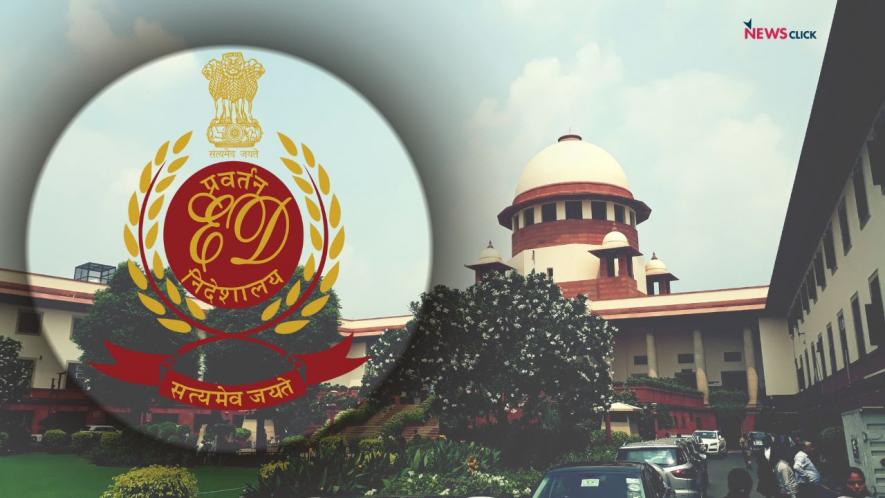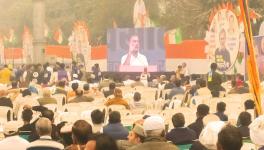Supreme Court’s Enforcement Directorate Ruling Step in Right Direction

On 11 July, a three-judge bench of Supreme Court justices BR Gavai, Vikram Nath and Sanjay Karol ordered that the repeated extensions granted to Sanjay Kumar Mishra in his tenure as director of the Enforcement Directorate were illegal. Mishra has been asked to leave his position on 31 July, four months before he was due to retire.
During Mishra’s tenure, the Enforcement Directorate was repeatedly blamed for targeting those who questioned the incumbent regime. [The top court did not entertain a recent plea by 14 Opposition parties that the central agencies have engaged in selective targeting.]
Still, the perception in many circles about the agencies and the chief of the Enforcement Directorate is that nobody was safe if they did not praise or support the ruling party and its top leadership—media institutions, Opposition parties or their financiers, even ordinary citizens who vent their angst over minor issues on social media or who question the regime. Apprehensions that the Enforcement Directorate would catch up with them with its coercive powers have the power to spread fear and panic. Based on their experiences of the Bharatiya Janata Party’s government at the Centre, its critics would say that the Enforcement Directorate pursued every allegation against Opposition leaders for the last several years—unless and until the critic in question joined the ruling party.
In states not ruled by the BJP, the Enforcement Directorate is routinely charged with hounding the party in power, its Members of Parliament, ministers or legislators. The harsh provisions of the Prevention of Money Laundering or PMLA Act of 2002, made more draconian through amendments, often turned against non-BJP leaders and critics. Ruling-party members rarely seemed to be in the cross-hairs of this feared agency whose wide powers seem ever-growing.
A bitter consequence of facing charges under the PMLA is prolonged incarceration, for it binds the Enforcement Directorate to investigate serious offences. Those accused could have their properties attached under this law, even as court proceedings often drag on.
Opposition party leaders have often been taunted by the BJP leadership and supporters in its camp, who make no bones of their power over central investigative agencies. In February, after the Hindenburg report was published, Opposition parties demanded a Joint Parliamentary Committee to probe the alleged wrongdoings of the Adani Group. But Prime Minister Narendra Modi turned the Opposition’s demand on its head by saying on 8 February that the “ED had brought them together, which voters had failed to do.”
His statement is telling, for it obliquely acknowledges that the Enforcement Directorate, whose chief served through two extensions in three years, and had been granted a third, is indeed regarded in ruling-party circles as a weapon to use at will.
Parties Collapse, Governments Fall
Members of Legislative Assemblies and leaders of several Opposition parties have left their parties to join or extend support to BJP governments. Many would say they were stricken by fear of the central agencies, especially the Enforcement Directorate. Several times, the migrating MLAs have effectively split their party, making the anti-defection law—which prescribes the disqualification of ‘Aaya Ram-Gaya Ram’ legislators—toothless.
Some of these migratory leaders have openly confessed that central agencies quit pursuing them after they shifted loyalties. Harshvardhan Patil, former Congress MLA from Maharashtra, candidly said “no inquiries” were conducted against him and that he “slept soundly” ever since he joined the BJP before the 2019 Assembly election. His remarks came on the day the Nationalist Congress Party (NCP) chief Sharad Pawar charging the Centre with using the agencies to force the BJP’s opponents to support it or remain silent.
Everybody knows that several leaders in the Eknath Shinde camp got notices from the Enforcement Directorate when he was a minister in Uddhav Thackeray’s Maha Vikas Aghadi government in Maharashtra. When Shinde and 40 Shiv Sena MLAs supported the BJP government in Maharashtra, commentators no longer held back—they openly said these actions were prompted by these leaders’ sense of fear and desire for self-preservation.
The forced collapse of the Thackeray government is a glaring instance of Opposition parties suffering vertical splits and legitimate governments collapsing to thwart punitive action. Recently, the NCP itself split vertically after senior leader and MLA Ajit Pawar decided to become a Deputy Chief Minister in the BJP-led Maharashtra government, which did not even need more MLAs to continue in power. Nevertheless, the BJP has given Ajit Pawar a plum post, and numerous others who migrated with him are now Cabinet ministers in the Shinde government. Just a week before this turn of events, the Prime Minister had accused the NCP and its leaders of alleged ‘scams’. Indeed, Ajit Pawar and the other new ministers in Maharashtra had received those dreaded Enforcement Directorate notices.
What do all these examples indicate? Was the Enforcement Directorate chief getting extensions because he took harsh measures against Opposition leaders? Or did the government renew his contract repeatedly so that he could take harsh measures? Discerning readers can draw their conclusions. According to the Supreme Court, the extensions were illegal, but it has not delved into the political considerations of the actions and omissions of the Enforcement Director.
Doctrine of Frightfulness
After the horror of the Jallianwala Bagh massacre of 1919, Mahatma Gandhi said Col Reginald Dyer, who illegally fired at unarmed peaceful protestors in Amritsar, exemplified the “doctrine of frightfulness”, which he also labelled as “Dyerism”.
The worrisome splits in Opposition parties and the fall of legitimate governments because of Enforcement Directorate action—or threats of action issued by leaders of the ruling party—replay this doctrine under British rule. Opposition parties have demanded the central government’s apology for having granted Mishra illegal extensions, but Union Home Minister Amit Shah said that the next chief of the agency would also pursue “dynastic” parties and their corruption.
Neutrality of Civil Services
Laxminarayan Sahu, a distinguished member of the Constituent Assembly from Orissa [now Odisha], said on 23 August 1949, during discussions on Article 320 (corresponding to Article 286 in the draft Constitution) dealing with the functions of Public Service Commissions, that India would form a Public Service Commission to ensure the “smooth and efficient running of our republican government”. But Sahu cautioned against democratic governments who may adopt “undesirable methods” for appointments in the services. He said, “We are going to form the Public Service Commission solely with a view that political parties may not be in a position to adopt such methods”. He also said, “...no one may be able to suggest that the services are working under the influence.”
But today, the facts before us are that a civil servant was illegally retained in a critical position—and, under him, the organisation came to be widely criticised for partisanship. Indeed, these extensions were cleared by the government of a party in power that harps on the capabilities of the same agency and berates Opposition parties for their alleged corruption. The Supreme Court ruling constitutes a modest step to reverse this trend where the doctrine of frightfulness combines with partisanship.
The author served as Officer on Special Duty to President of India K R Narayanan. The views are personal.
Get the latest reports & analysis with people's perspective on Protests, movements & deep analytical videos, discussions of the current affairs in your Telegram app. Subscribe to NewsClick's Telegram channel & get Real-Time updates on stories, as they get published on our website.
























